#SCROOGE (1951)
Explore tagged Tumblr posts
Text






A Christmas carol is my all time favourite Christmas story ❤️ it’s so nostalgic and classic, it’s not Christmas without it and these are my favourite adaptations I watch every year 🥰🎄👻 I’ve also added the man who invented Christmas as even though technically it’s not A Christmas carol I still love that it’s about the making of it ❤️
#my posts#Scrooge#scrooge 1951#a Christmas carol#a Christmas carol 1951#Alastair sim#barbie in a christmas carol#the muppet christmas carol#the muppets christmas carol#muppet christmas carol#Disney a Christmas carol#a christmas carol 2009#Mickey’s Christmas carol#Mickeys Christmas carol#the man who invented Christmas#charles dickens#Christmas#Christmascore#christmas core#i love christmas#christmas movies#christmas time#christmas love
27 notes
·
View notes
Text
fun fact i have discovered about the 1951 Scrooge movie
in the scene where scrooge meets jorkins for the first time he says he's starting a new company. scrooge later joins this company after jorkins offers him a job. marley is working there.
later, in the scene where jorkins is embezzling (the scene) they say the company has been in business for 17 years. this would be the company jorkins was starting. the year is 1836, it's seen on a book right before this, so scrooge + marley have been coworkers here for 17 years. in this scene they take over the company.
in the next scene, Past says "Jacob Marley worked at your side for eighteen years." A source I found implies that they're meant to be 21 in the scene where they meet. 21 + 18 = 39.
Marley was only 39 when he died, the same age as Michael Holdern when he played him.
Marley was only 39, and they were only in business independently for one year. one year at most, depending on how long marley was dying.
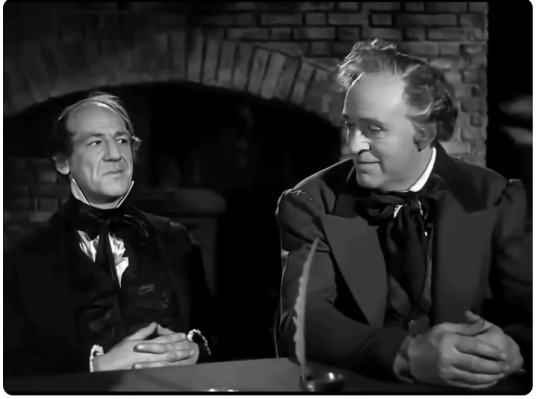
whatever these two were to each other, they only had a year in business together.
and that's fucking sad
#jacob marley#ebenezer scrooge#a christmas carol#scrooge 1951#me and vincent were losing our shit when we mathed the math#scrooge x marley#such a fucking waste of life and love#pathetic old gays
69 notes
·
View notes
Text
Christmas Carol-cember, Day 1
Ever since Charles Dickens published “A Christmas Carol” on December 1843, it has become a staple of the Christmas season.
From public readings to performances on the stage right up to the early inception of film in the 20th Century, it’s as much a cornerstone of the festive season as much as St Nick is. So with the advent of 20th Century, a new format of media known as cinema was able to take the story to new heights and explore elements that Dickens possibly could not have imagined within the limitations of his time and the thinking of that day.
So to start this month off properly, I figured, what better way to begin a month that explores the story of A Christmas Carol than with the film that is regularly ranked as being one of the best versions of the story, Brian Desmond Hurst's 1951 UK adaptation simply titled “Scrooge."
But most people just call it “The Alastair Sim Version.”

I won’t go into the story synopsis as I think it’s pretty well-known at this point, so instead, I want to touch on what it is about this film that gives it the reputation of being so beloved.
The first reason is that, for an adaptation, it adds more to the story than what it takes out. This works to its advantage by being able to explore elements of Scrooge’s backstory that are not covered in the original novel. For instance, this film allows us the viewer to see Scrooge’s business dealings with Jacob Marley, their cut throat practices that results in shutting down Fizziwig and enriching themselves financially. These story changes provides visual and emotional clarity that allows for us, and by extension Scrooge, to recognize how cruel his past has made him.
The other is it’s leading man, Alastair Sim.
Alastair Sim began his acting career in his 30s, after his time in the British military where he fought in World War I, where he honed his craft with Shakespearean performances on stage but occasionally dipping into film roles during the 1950s.
Alistair Sim was what one calls “a Character Actor.” Someone who takes the time to understand the character presented to them in a script; their quirks, their lines, their emotional state, and to embody them as soon as the director calls action.
And Alastair Sim, with no exaggeration, took that challenge and delivered a knockout performance.
For all the scenes that are built upon from it’s original source, Sim gives these scenes the emotional weight that is called for, while adding some truly subtle quirks that feel directly connected to the character.
The way he sneers when a tavern owner tells him bread will cost extra and he coldly tells him off.
The way he tries to be in control while terrified to see the ghost of Jacob Marley.
The way his faced body is wracked with heartache to see his ex-fiance is genuinely happy to work with the poor and sick while he remains empty and alone.
Even when he changes by the film’s end and he has been given another chance, he is bubbling with ecstasy that you would think he HAD gone crazy.
But my favorite subtle moment comes from the end.
After playing his prank on Cratchit and promising to support him and his family and sends him off to get more coal for the fire, there’s a moment as he chuckles where his smile flattens and he says “I don’t deserve to be happy” before he breaks into chuckles again and shifts back to positivity.
Almost as if a part of his old mean self lingered and tried to make a return before it was pushed back down by the newfound joy he discovered.
To put it bluntly: Alastair Sim is not playing Ebenezer Scrooge.
He’s playing an old, bitter, selfish and deeply traumatized man whose name is Ebenezer Scrooge.

And that difference in how he approached the role is key to why his performance, again and again, is highly ranked by fans as well as other actors. Much to the point that his performance has become the gold standard of how this performance is to be played.
Whether it’s a school play or a local theater production; every actor since this film has been trying to recapture that magic that Alastair Sim delivered in black and white.
This is a very good adaptation of the Charles Dickens story and well worth checking out. It might be one of the best to explore its character with added emotional weight that is carried by a star-making performance from Alastair Sim. It’s pacing is a tad slow, but when you have a performance this compelling, you almost don’t think about it as he draws you in.
“Scrooge” can be streamed on Tubi.
Next time, we look at a performance of Scrooge from another character actor, but one from the 1980s...

8 notes
·
View notes
Text
Happy Pride Month to the gayest exploiters 🏳️🌈
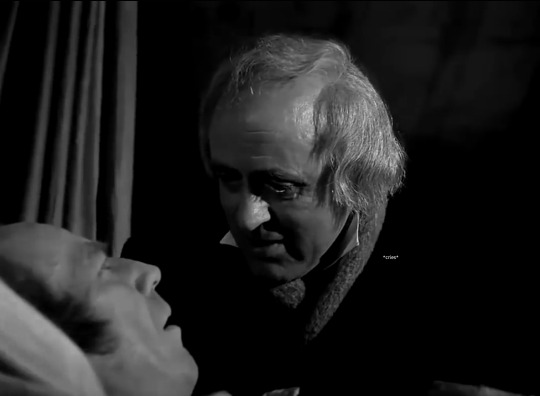
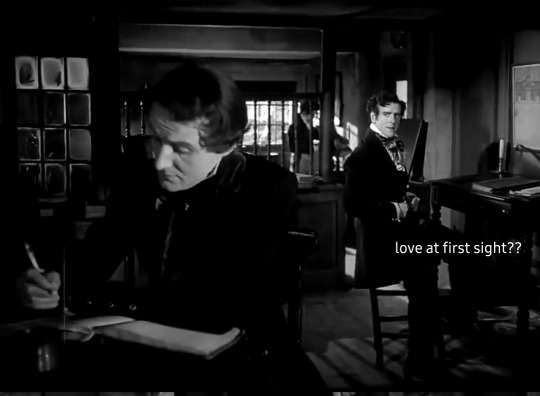
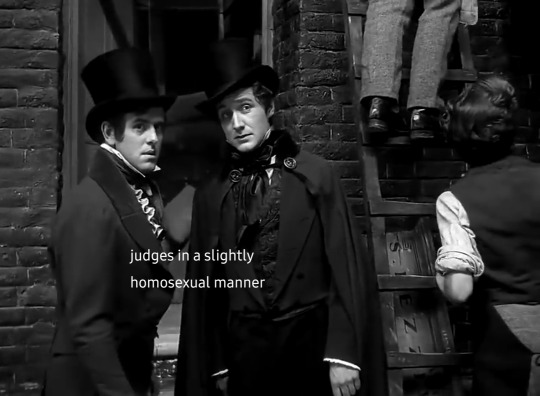
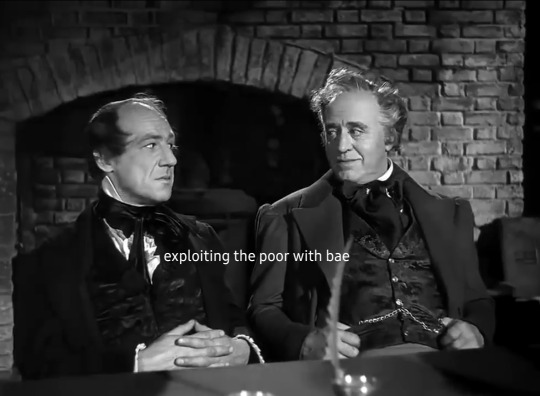
#pride 2023#There is no way the tension between them wasn't intentional though that's all I can say#a christmas carol#Scrooge 1951#jacob marley#ebenezer scrooge#scrooge x marley#I wish gay people were real
104 notes
·
View notes
Text

Alastair Sim as Ebenezer Scrooge in Scrooge (1951)
Watercolors on Paper, 8.5" x 11", 2024
By Josh Ryals
#alastair sim#scrooge#ebenezer scrooge#scrooge 1951#a christmas carol#a christmas carol 1951#charles dickens#original art#portrait#painting#watercolors#fan art#josh ryals#joshua ryals#josh ryals art#joshua ryals art#joshryalsart
8 notes
·
View notes
Text
As I've been rewatching the different film versions of A Christmas Carol this year, I've been noticing something that I didn't even notice last year as I reviewed them for A Christmas Carol Holiday Season. Without changing the fundamentals of the story, different versions bring out different aspects of Scrooge's character arc.
It's similar to the phenomenon I've noticed in different screen and stage adaptations of fairy tales. For example, the way some versions of Cinderella are about the value of kindness, others are about never losing hope in the face of adversity, others about an outcast finding acceptance and love, others about an abuse victim discovering her own self-worth and inner strength, etc.
I suppose A Christmas Carol is a modern literary fairy tale, so it's no surprise that different adaptations find very different meanings in it.
For example:
Alastair Sim's 1951 Scrooge was once a good-hearted young idealist, but due to various external factors – his lonely childhood, his beloved sister Fan's death, the corrupt Mr. Jorkin replacing Fezziwig as his employer and mentor, and finally the loss of his fiancée Alice – he gradually came to view the world as a "hard and cruel place." So he steeled himself against it by turning cold and ruthless. The ghosts' job is to show him that the world isn't as cruel as he thinks it is; to remind him of all the kind, caring people both from his past and in his present, and to show him that kindness is the real solution to human suffering, while hardening himself has only caused and will cause more suffering, both for others and for himself.
Albert Finney's 1970 musical Scrooge is less icy than Sim's and more of a bitter, misanthropic workaholic who's forgotten how to appreciate the joys of living. Due to his lonely, awkward youth and the shattering loss of his fiancée Isabel, he declares "I hate life because life hates me!" and regards other people as leeches and fools, while seeing himself as a fine, upstanding gentleman forced to put up with them. The ghosts' job is to snap him out of his self-delusion and self-pity, and to teach him to joyfully live life to the fullest – which includes spreading kindness and cheer to others as well as enjoying himself – while he still can. A sharp reminder of his own mortality ensures that he learns the lesson.
For Michael Caine's Scrooge in The Muppet Christmas Carol, the emphasis is more on the lack of love in his life. Because he was neglected as a child and taught only to value business by Sam the Eagle his stern schoolmaster, he's never quite understood human bonds, and when he had one bright, shining chance for a different life through his love for Belle, he let it slip away. As a result, years of loneliness have turned him harsh and cold. The ghosts' job is to teach him the importance of love – both personal love of family and friends and more general love for his fellow Muppets and man – and to force him to admit how unhappy he is being alone with no one to love or to love him, breaking his heart until he changes.
I haven't managed to rewatch George C. Scott, Patrick Stewart, et al this year. But since the Christmas season technically lasts until January 6th, I plan to rewatch them, and I'm sure I'll find similarly unique spins on Scrooge's character arc.
All of these approaches are valid. They all draw on aspects of Scrooge's journey in the book. But each approach adds to the unique identity of each adaptation.
@ariel-seagull-wings, @cliozaur, @warrioreowynofrohan, @bliss-bliss-bliss-bliss
#a christmas carol#adaptations#ebenezer scrooge#character arc#characterization#scrooge 1951#scrooge 1970#the muppet christmas carol#alastair sim#albert finney#michael caine#fictional characters
38 notes
·
View notes
Text
Here's my review of this version from last year.
As I wrote then, it's not the version most faithful to Dickens, or the one I regard with the most sentimental fondness, but as a movie, in and of itself, it's probably the best adaptation.
Excellent point about this version of Scrooge becoming a mean miser because of grief turned to bitterness rather than out of greed borne from desire for respect and prestige. I've just been thinking, and recently posted, about the different slants that different adaptations place on Scrooge's character arc. Alastair Sim's Scrooge arc focuses more on breaking the inner walls he raised to protect himself from pain, while Albert Finney's is more about learning to live life to the fullest, Michael Caine's is more about learning the value of love, etc. Each one is slightly different from both the others and from the book.
I rewatched the Alistair Sim (1950s) movie of A Christmas Carol tonight and wanted to jot down some thoughts.
The first part of the movie, up to and including Marley’s Ghost, is extremely faithful to the book - to the point of replicating most of the original dualogue, and also adding some of the lines from Dickens’ narration to the dialogue. About the only addition is Scrooge harshly refusing a debtor who begs for a few more days to pay, something which is in line with Scrooge’s typical behaviour - as shown by the couple in the Christmas Yet to Come part of the book, who are relieved by his death because they are unlikely to meet with another creditor who is so merciless - but which is not directly depicted in the book. There’s even a scene where a blind man’s dog pulls him up an alley away from Scrooge, like the narration in the book describes! And the change in music from Bob Cratchit joyfully heading home on Christmas Eve to Scrooge taking his “melancholy dinner in his usual melancholy tavern” perfectly conveys the change in mood in the book between those two scenes. The ghosts mourning that they cannot help the poor woman, at the end of the Marley sequence, are also included.
Oh, the other addition in that section is Scrooge’s statement that his nephew married “against his [Scrooge’s] will”, which is not specifically from the book.
The Christmas Past section is the part where the adaptation makes the most changes. Fan is an adult (or at least is, like Scrooge, in her late teens) when she comes to get Scrooge from the school; his relationship with her is given more centrality as he says she is the only one who ever cared about him, and that if he is not to be lonely then she must live forever. She is also shown dying after giving birth to Fred, and it is said that Scrooge’s mother also died giving birth to him, which his father resented him for. Also, Fan on her deathbed asks Scooge to look after Fred, but only after he’s left the room, so he doesn’t hear her; the moment he hears it is when we see the present-day Scrooge express real remorse. None of this is from the book - Scrooge’s mother clearly did not die giving birth to him in the book, as his sister Fan is much younger than him there. (Also, like all other adaptations I have seen, Scrooge’s memories of the joy he found in reading during his lonely Christmases at school are omitted.)
Scrooge’s business career is also expanded upon, with him (after Fan’s death, which is thereby implied to have embittered him) leaving Fezziwig’s employ for that of an unscrupulous man who also employs Mr. Marley; Fezziwig going out of business; and Scrooge later buying a controlling share in his unscrupulous employer’s company. I can see why the movie does this. The change lets it more dramatically show Scrooge’s change from the young man who worked for Fezziwig to the harsher, more ambitious, more avaricious man he became, rather than us hearing that only from his fiancée. For this reason, I’m more okay with this expansion than I am with the changes around Fan; I think the latter too heavily frames Scrooge’s later mindset as due to grief turned to bitterness, whereas in the book it’s more about greed borne of the desire for worldly respect and prestige.
Likewise, like The Muppet Christmas Carol, the movie shows Scrooge and his later-fiancée (here called Alice, not Belle) at Fezziwig’s party - a change which lets us see more of the relationship than just its end.
We also get a (rather unnecessary, IMO) deathbed-repentance scene from Marley, where hetells Scrooge they were wrong and to save himself, but Scrooge does not understand. There is nothing of the sort in the book.
There’s also another interesting shift. In the movie, Fezziwig says he’d rather go out of business than adopt the “new methods” of doing business, and then he in fact does go out of business. Alice says that when she became engaged to “they were both poor and content to be so,” full stop. In the book she says, “we were both poor and content to be so, until we could improve our fortunes by patient industry”. In a way, this feels like the movie grappling with a question surrounding the book - can one run a successful business in an ethical way? can one become well-off ethically? - that the book itself does not take up; but the movie ends without returning to the question and Scrooge’s later reformation indicates that yes, one can. Also in this vein, where the book shows Scrooge’s fiancée later on happily married with a houseful of children, the movie shows her caring for poor people on Christmas in something like a homeless shelter/food kitchen, which further dramatizes the differences between the paths they have chosen, that of avarice and that of charity.
The section with Christmas Present is very close to the book - the Cratchit family dinner again uses much of the original dialogue, and also integrates parts of Dickens’ narration into the dialogue. Christmas Present is almost exactly as the book describes him, and as the original illustrations in the book shown him, and even the celebration of the “miners, who labour in the bowels of the earth” is shown. Fred’s Christmas party is shown, and even the minor characters of Tupper and the woman he’s courting from the book (though in the book she is described as the ‘fat sister’ and here she is not fat). Fred’s joke about Scrooge is omitted and his goodwill to him is emphasized (the opposite of Muppet Christmas Carol, which focuses on the joke and on no one liking Scrooge; I think this versiondoes better in that respect).
The section with Christmas Yet To Come is similar to the book (though it starts off with Tiny Tim’s death - a good choice, I think, as it keeps all the material surrounding Scrooge’s death as a single sequence). The debtor family who are relieved at Scrooge’s death are left out, but the rest is similar to the book, and the rage-and-bone shop scene conserves a lot of the origibal dialogue word-for-word. This movie is where Mrs. Dilber as the charwoman - a small change from the book - and the expansion of her character comes from, and she is a good comic character with several great lines. The scene in the bedroom with the body is omitted, which I think is a necessity of film - even if Scrooge failed to recognize his own charwoman and his own curtains, film would make it too implausible that he could fail to recognize his own room.
Muppet Christmas Carol has a much better and spookier Spirit of Christmas Yet to Come than the 1951 film has - the faceless void is very unsettling, whereas in 1951 the spirit is clearly just a person with a black sheet of fabric over them (in one scene you can see the person’s face through the fabric). But that’s the difference between special effects in the 1950s and the 1990s.
Scrooge’s delight at finding he is still alive is dramatic verging on hysterical and gives some more funny moments, and, as in the book, he sends the turkey to the Cratchits’ anonymously and then goes to visit his nephew’s party (rather than showing up at the Cratchits’ with the turkey in person as in the Muppet version’s crowd song). And the depuction of him chuckling as he sends the turkey and writes the note is direct from the book. His apology to Fred’s wife feels like it has too much emotional emphasis given that he has never met her before; it’s as though the movie is treating her as a proxy for the apologies he would like to make to Fan and to Alice. But the scene on the whole is lovely, and the ending with Bob Cratchit is very good.
On the whole, this is a good adaptation - better than the Muppet one in some ways (particularly the Christmas Present scene, where it focuses on others’ celebrations as well as how Scrooge has made the Cratchits’ lives harder, whereas the Muppet one focuses on Scrooge being disliked). Its main weaknesses in my opinion are 1) an overemphasis on the role of Fan’s death in the younger Scrooge’s downward moral trajectory; and 2) Scrooge’s desire to change not coming until very later in the film, when he sees the callous reaction to his death.
I would recommend this adaptation to anyone who hasn’t seen it - it’s up there with the Muppet one as one of the best that has been made, and I was amazed at how many lines from the narration they had added to the dialogue, and how much of the atmosphere of the narration they captured (as one example, Bob is actually shown trying to warm himself at the candle). It’s available both in black and white and in a colourized version (as in, they later came along and physically coloured in the film reels; I can’t imagine how much work that must have been!).
21 notes
·
View notes
Text


Bette Davis visiting the set of Scrooge—1951, with Alastair Sim and Brian Desmond Hurst (middle).
Source: Scrooge-1951 version-Alastair Sim, Facebook
40 notes
·
View notes
Text

#Scrooge#A Christmas Carol#Alastair Sim#Mervyn Johns#Hermione Baddeley#Jack Warner#Kathleen Harrison#Michael Hordern#George Cole#Brian Desmond Hurst#1951
8 notes
·
View notes
Text
What movie adaptation of A Christmas Carol is Ted most likely to show the team? I may be leaning towards the 1984 version, but there might be better options? (The Muppet version is not an option, because of fic reasons. And as the fic is set during season 2, the Disney version from last year is out too.)
#i am writing fic and Need To Know#would he go for an old classic like Scrooge from 1951?#or something more contemporary?#help me dear hive mind
19 notes
·
View notes
Text
should i watch christmas movies this year?
5 notes
·
View notes
Text




W A T C H I N G
#SCROOGE (1951)#A CHRISTMAS CAROL (1951)#Alastair Sim#Mervyn Johns#Glyn Dearman#George Cole#Brian Worth#Michael Hordern#Francis de Wolff#Michael Dolan#Ernest Thesiger#Rona Anderson#Hermione Baddeley#CHARLES DICKENS#Horror#Christmas movie#Supernatural horror#WATCHING#Ebenezer Scrooge
1 note
·
View note
Text
"The world is on the verge of new and great changes, Mr. Scrooge. Some of them, of necessity, will be violent. Do you agree?" "I think the world is becoming a very hard and cruel place, Mr. Marley. One must steel oneself to survive it. Not be crushed under with the weak and the infirm."

#jacob marley#ebenezer scrooge#scrooge 1951#a christmas carol#look i know hes returning marleys energy here#but scrooge immediately taking marley's polite chat to the next level always gets me#youre making small talk with the new hire and he instantly starts talking about his nihilism
10 notes
·
View notes
Text
“Your servant, Miss Scrooge.” Miss Marley’s voice was low and dark, like inked figures.
Reblog with a random sentence from your wip.
#yeah I’m working on the lesbians#the gothic heroine Scrooge au#two bitch wives who are also versions of 1951 Scrooge
2K notes
·
View notes
Audio
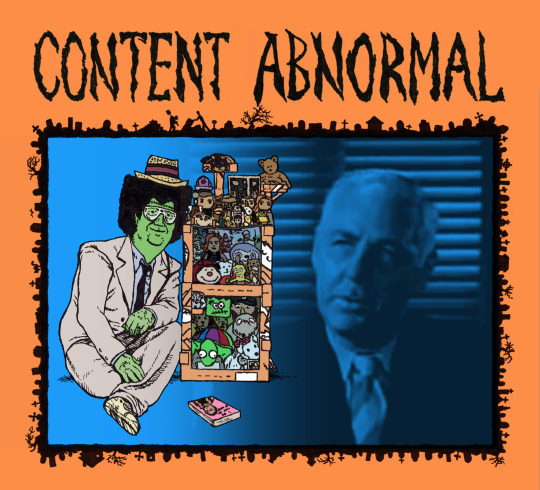
This week on Content Abnormal we present William Johnstone in The Shadow adventure “House Of Fun”!
Order We Belong Dead magazine issue #34 HERE
#content abnormal#horror host#frankentyner#william johnstone#bill johnstone#the shadow#lamont cranston#margo lane#otr#radio#house of fun#1939#pilot x#barbarella#jane fonda#bernard lee#m#james bond movies#alastair sim#scrooge 1951#a christmas carol#alice in wonderland 1951#the terror#the terror 1938#edgar wallace#King Kong#barbarella queen of the galaxy#hazel park library#midnight movies
3 notes
·
View notes
Text
A slightly macabre detail in the movie Scrooge (1951):
The bed Scrooge sleeps in is the same bed Marley died in.
This isn't just a case of a prop being reused. It's explicitly said that after Marley's death, not only his house but his furniture all went to Scrooge. It's the same bed.
Alastair Sim's Scrooge is braver than he gets credit for! No wonder the ghosts feel free to scare him, without worrying about how it might effect his mental or physical health. If he can handle sleeping every night in a bed where a man died – where he watched that man die – he can handle anything!
37 notes
·
View notes